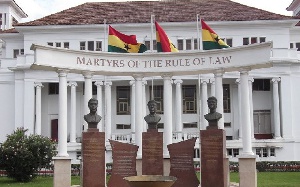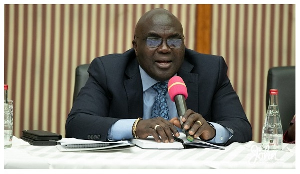The Supreme Court’s (SC) full judgment, which unanimously gave the Electoral Commission (EC) the green light to commence compilation of a new Voters Register is ready.
A source at the Court's Registry said the entire judgment, which included its reasons, was ready and parties in the matter could pick up true certified copies by noon today.
The source said other persons interested in the entire judgment could also apply for true certified copies at the Registry.
On June 25, this year, the SC presided over by Chief Justice Kwasi Anin- Yeboah gave the EC the go ahead to compile the new register in line with Constitutional Instrument (CI) 126 (2020).
Constitutional Instrument 126 excludes the use of existing voters Identity Card and the use of birth certificates for the registration of the new voters’ card.
This implies that one could only register with the Ghana Card issued by the National Identification Authority (NIA), a passport or two persons serving as guarantors for an applicant.
In the SC’s consequential orders, the Chief Justice said: “By this decision, the EC is hereby directed to commence the compilation of the Voter Registration Exercise as scheduled.
“By these decisions, and by virtue of Article 130 (2) of the Constitution, any court in which same or similar action is pending or yet to be filed shall apply the decision rendered by the Supreme Court in these consolidated suits”.
Delivering judgment, the court upheld reliefs two and three of the writ and dismissed five other reliefs sought in the consolidated writ issued by the National Democratic Congress (NDC) and one Mark Tekyi-Banson.
“Relief two is granted subject to the fact that all eligible voters must make themselves available for registration as directed by the Electoral Commission pursuant to the Public Elections (Registration of Voters) (Amendment) regulation, 2020 CI 126.
Relief three: This is granted subject to the Voter Registration card issued to an eligible voters under the prevailing constitutional Instrument CI 126,” the SC said.
The SC reiterated an earlier decision of the court in Abu Ramadan and Nimako case where the court re-emphasized that the EC in exercising its discretion in the discharge of the constitutional mandate in cleaning the Voters Register, “should be deemed as authorized to be acting within the law and the regulation therein, and cannot be faulted even if it is considered that there is more efficient mode or method available.”
Accordingly, the court further held that, the EC in performing its mandate under Article 45 of the Constitution could not be compelled to act in a particular manner unless, “there is a clear evidence that they have acted unconstitutionally”.
It however fixed July 15 to give its reasons on the June 25 decision of the court.
The NDC and one Mark Tekyi-Banson in writs, which were later consolidated challenged the EC’s refusal to accept existing voters ID Cards as requirements for the ongoing voters registration exercise.
On June 24, this year, the SC dismissed an Amicus brief filed by IMANI Ghana and other Civil Society Organizations (CSOs), saying their application to be joined to the suit was not supported by law.
According to the SC, the CSOs had not been neutral in the matter and they had also introduced new issues in the suit.
The SC noted that reliefs being sought by the CSOs were virtually the same and wondered why counsel for the CSOs did not read them before filing an application for Amicus brief in court.
It is the case of the NDC that a new voter’s register will deprive many Ghanaians the right to vote at the December polls, if the existing Voters’ ID card is rejected.
The EC however registered its disagreement on the contention of the NDC.
In its suit, the NDC argued that that the EC lacked the power to go ahead with its plans because it could only “compile a register of voters only once, and thereafter revise it periodically, as may be determined by law”.
The EC among others had argued that the old Voters ID cards were obtained under three different Constitutional Instruments: CI 12, CI 72 and CI 91.
In its supplementary statement of case, the EC said it had placed before Parliament a Constitutional Instrument that did not include the use of the existing Voters’ ID Cards.
Mr. Godwin Edudzi Tamaklo, represented the NDC whiles Mr. Cosmas Apengnuo, represented Banson.
Mr. Justine Amenuvor, represented the EC, with Mr. Godfred Yeboah Dame, Deputy Attorney General representing the Attorney-General.
Other Justices on the SC panel are: Jones Dotse, Paul Baffoe Bonnie, Sule Gbadegbe, Samuel K. Marful-Sau, Nene A. Amegatcher and Prof. N. A. Kotey.
General News of Wednesday, 15 July 2020
Source: GNA

















